#kanji study
Text

One of the way I’m exploiting to learn kanji in a very efficient and funny way is to use the lyrics of the songs I love the most from Hypnosis Mic and Paradox Live (or any other anime opening/ending I’m hyperfixated with)... And I always find very brilliant how the authors scatter clues all around the text lol
This is the last line of Gentaro’s last verse in “とりま Get on the floor“ and, studying the kanji part, I noticed how simply clever the use of the 3 kanji I circled is, one for each one of the FP members’ names, to create the sentence:
For Ramuda, the kanji used is “乱” (the first of his first name), which means “disorder, riot, war, disturb“;
As regards Gentaro, it’s easy to identify the kanji “夢”, which mostly means “dream”, which is the first kanji of his last name;
Finally, the kanji used to represent Dice is “統”, second kanji of his first name, which can be translated as “ruling, control, governing”.
Bonus: It’s funny even how the order they have been used follows the rule of 1st (Ramuda), 2nd (Gentaro) and 3rd (Dice) member!
#kanji study#kanji#japanese#learning japanese#日本語#hypnosis mic#hypmic#ramuda amemura#amemura ramuda#dice arisugawa#arisugawa dice#yumeno gentaro#gentaro yumeno#anime#manga#japanese rap#japanese music#torima get on the floor#とりま Get on the floor#cross a line#fling posse#fp
77 notes
·
View notes
Text
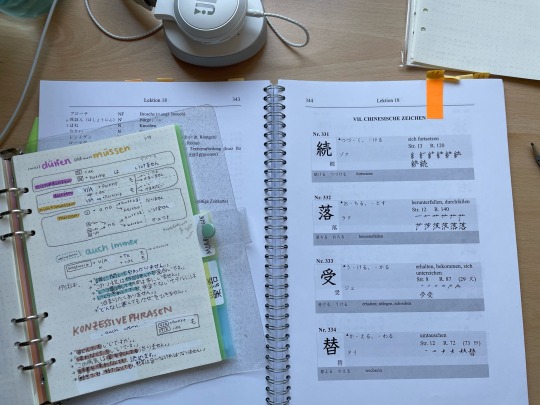
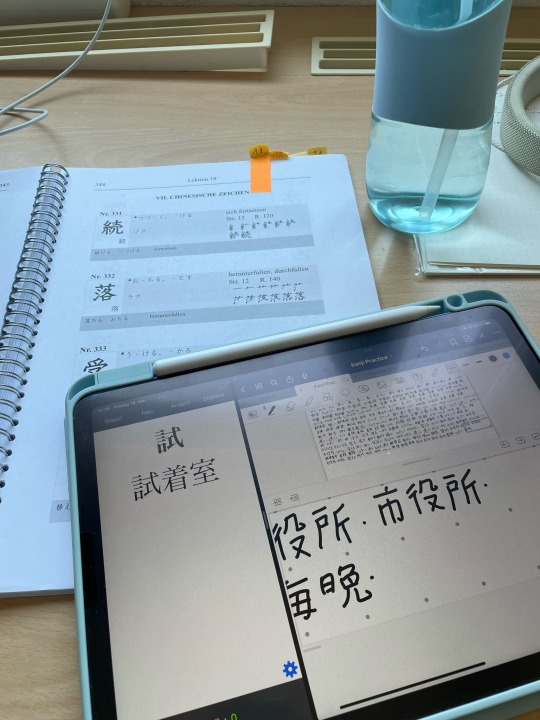
currently on that kanji grind!!!!
#studyspiration#studyblr#language study#japanese study#kanji study#studyinspo#langblr#language learning
10 notes
·
View notes
Text
Practice Sentences
April 4th, 2023
ほしのはきみだけなんだ [hiragana]
欲しいのは君だけなんだ[with kanji]
Hoshi noha kimi dake nanda
All I want is you
欲しい [kanji + hiragana]
Hoshi
Meaning: wanting (to have), desiring, wishing for
Only as い adjective
I want you (you, them, etc), to do.
(After the -te form of a verb, usually written in kana]
欲
JLPT 3
ほしい い adjective wanting (to have), desiring, wishing for.
5 notes
·
View notes
Text
4 kanji + vocabulary - Day 23

宅
**音:**タク
訓:
Meaning: residence
Vocabulary:
宅配「たくはい」= home delivery
字
**音:**ジ
訓:
Meaning: letter
Vocabulary:
数字「すうじ」= number
字幕「じまく」= subtitles
安
**音:**アン
**訓:**やす*い
Meaning: safe/cheap
Vocabulary:
安全「あんぜん」= safe
安定「あんてい」=stability
宣
**音:**セン
訓:
Meaning: proclaim
Vocabulary:
宣伝「せんでん」=advertisement
#4kanji day#kanji study#japanese#langblr#japanese langblr#japanese learning#japanese vocabulary#mine
2 notes
·
View notes
Text

Studying and I just... I mentally call Kanji like this "snail Kanji" because they look like a snail with a cool shell
0 notes
Text
I have a love hate relationship with kanji, I enjoy writing it I find it relaxing. Shame I can never recall the meanings though but, I guess that will come.
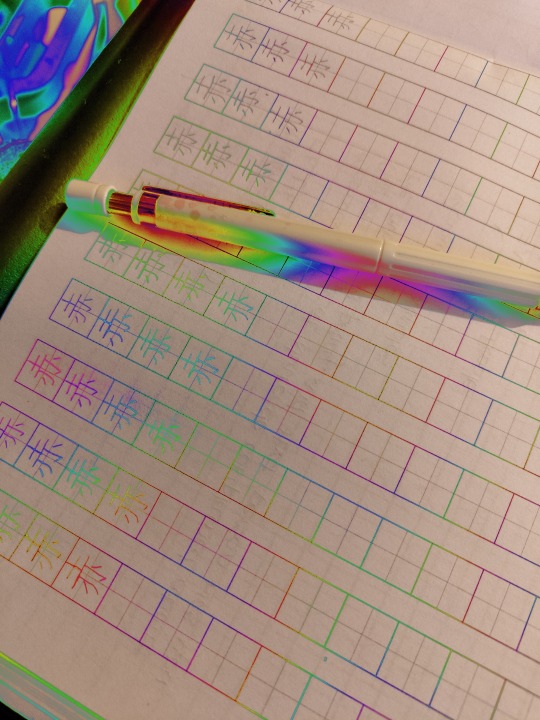
#cfs (chronic fatigue syndrome)#chronically ill#fibromyalgia#myalgic encephalomyelitis#kanji#kanji study#japanese#learn japanese#learning japanese
1 note
·
View note
Text
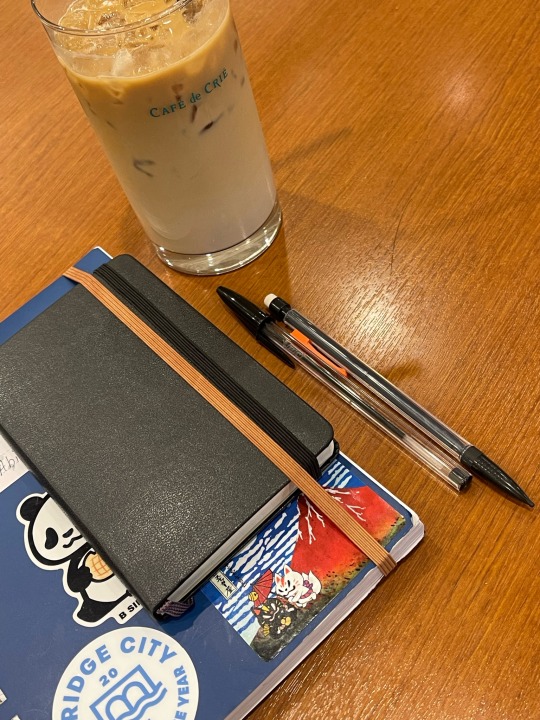

#studyblr#study blog#langblr#langblog#japanese langblr#japanese language#japanese#studyinspo#study motivation#study aesthetic#japanese kanji#japanese manga#learning japanese#student life#language learning#language blog#language
241 notes
·
View notes
Text
japanese is such a kind language. like you forget a character it will hold ur hand and tell u that everything will be ok and you can just write it in hirigana and everyone will understand :)
and then chinese is like oh im sorry you forgot a character? youre illiterate. you mispronounce a word? your mother is now a horse
#japanese#kanji#hirigana#chinese#language#langblr#language memes#funny shit#funny#shitposting#memes#tweet#linguistics#cunning linguist#linguistness#linguistique#linguine#language study#language stuff
329 notes
·
View notes
Text
I learned it's easier to learn verbs in their ない form first, vs. their dictionary form first. Makes recognizing the difference between Godan and Ichidan verbs 100% easier and removes the need to "remember" the "hidden/fake/lying" verbs that parade as the other verb type. The trick to doing it is far easier and I hate how Genki teaches it in the book.
Leaving me with only having to learn the conjugation patterns for Ichidan, Godan, and Irregular verbs. Far, far easier.
#learning japanese#fountain pen#jlpt#jlpt n5#kanji#japanese#日本語#senchastudying#studying#studyblr#langblr#language#fountain pen ink#見#Verbs#Japanese Verbs#Japanese Vocabulary#japanese langblr
265 notes
·
View notes
Text
Credit to @japanese_with_josh
I found this really helpful to hear a real life situation- not just from a textbook!
#japanese#language learning#studyblr#日本語#japan#langblr#japanese grammar#study japanese#nihongo#study#learn japanese#langblog#study kanji#travel#jlptn5#kanji#languages#language study#study abroad
663 notes
·
View notes
Text
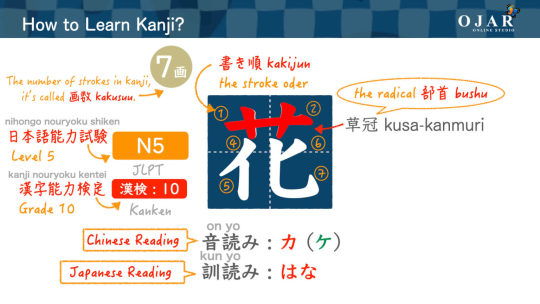
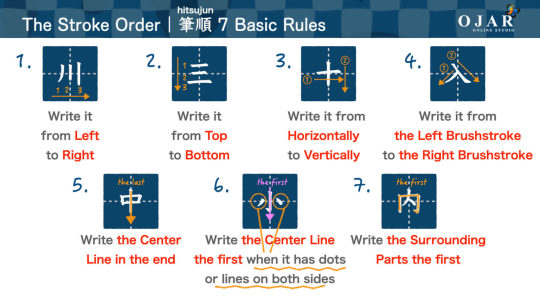
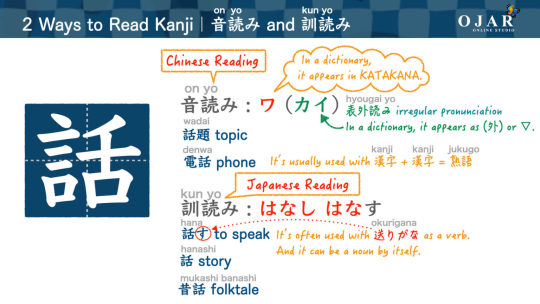
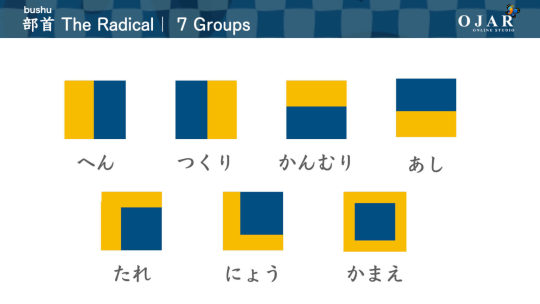
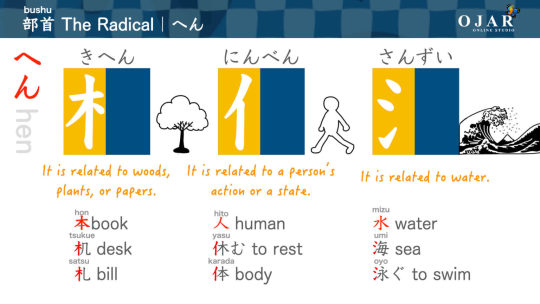
i was very surprised at how difficult it was to find (good) resources for learners that accurately describe how 部首 (in English we translate this to be the "radical") work in 漢字 (kanji). i pulled these from a very comprehensive guide of kanji from おじゃちゃん, a native speaker who is also a language teacher and if youre interested in learning more, you should check out her full overview here.
to a beginner this might not be as useful - but when you get deep enough into japanese i think it's worth it to understand how kanji is actually used by native speakers. understanding how the radical works can also help you guess at meanings and recognize common patterns that may make memorizing kanji easier
#mocha speaks#japanese langblr#learning japanese#japanese kanji#typically most english-speaker-centric guides describe the radical as 'building blocks' of kanji#which makes sense as a memorization tool#however if you ever went far enough in your studies you might need to unlearn all of that - the radical is actually a classification system#i'll stop there at the risk of going on a tangent in the tags#but yeah being aware of what it is at least could be helpful down the road#especially if you want to start using native resources. bc they use the radical much more differently than a learner might be used to
88 notes
·
View notes
Text

Time for another kanji curiosity (when did I start this stuff?)!!
This kanji can be read as “raku, gaku, tano.shimu” and it’s used in both words for “music” ( 音楽 = ongaku) and “enjoyable, fun” ( 楽しい = tanoshii).
I think there’s a very deep meaning in the use of the kanji of “fun” in the word of “music”... because, u know... Music is funny and makes people happy! (音楽は楽しいです!)
Don’t you think? :)
#kanji#kanji study#learning japanese#japanese#music#not me being totally fascinated by this kind of breakthroughs
4 notes
·
View notes
Text
My kanji is terrible and I recently learned about the book by Andrew Scott Conning.
The Kanji Learner Course is an amazing book for learning kanji, the best thing about it which made me buy it was the fact that it explains how to remember every single kanji like a teacher.
I have only done till the first 100 kanjis for now but it's definitely a wonderful book!
I highly recommend buying it if you want a comprehensive kanji book.

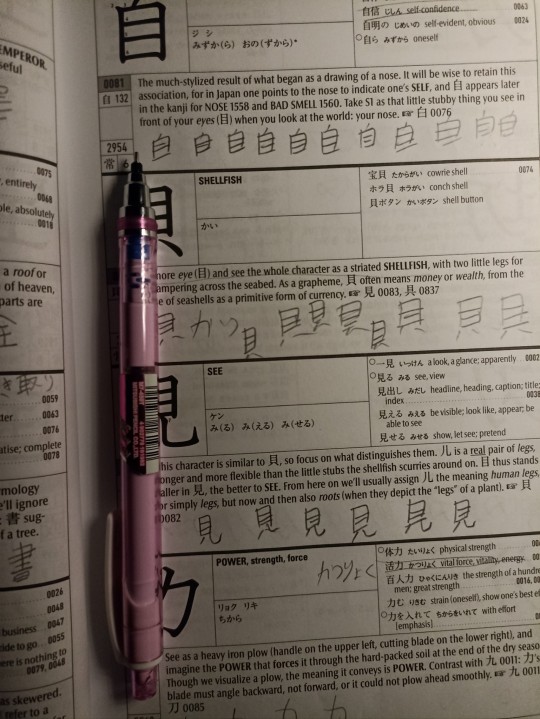
#japanese#japanese language#jlpt#jlpt n2#languages#studyblr#studying#japanese books#language learning#study with me#kanji#japanese kanji#andrewscottconning#kanjicourse
76 notes
·
View notes
Text
Pitch, Please Pt. 1 [new series alert]
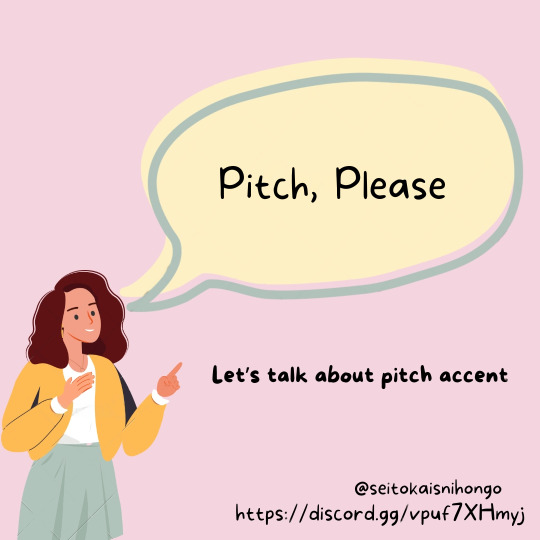
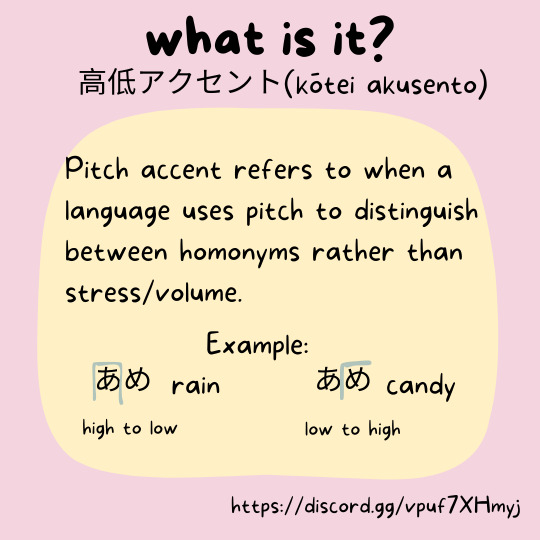
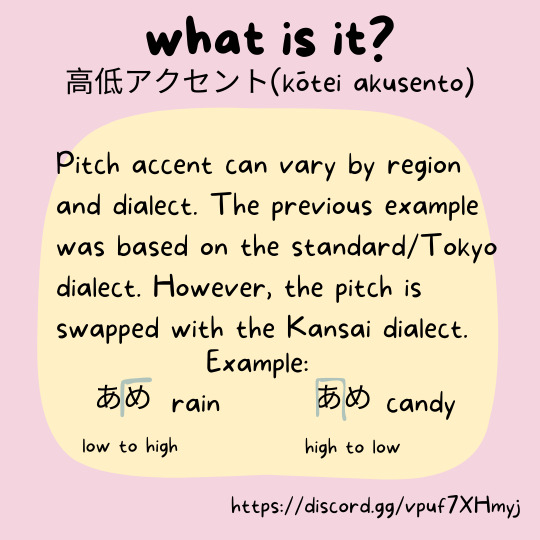
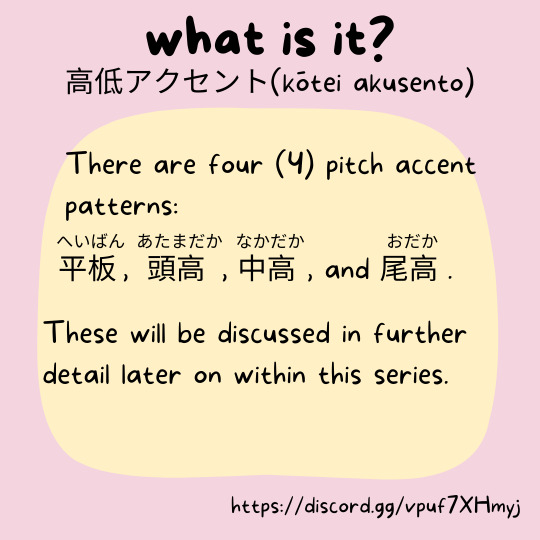

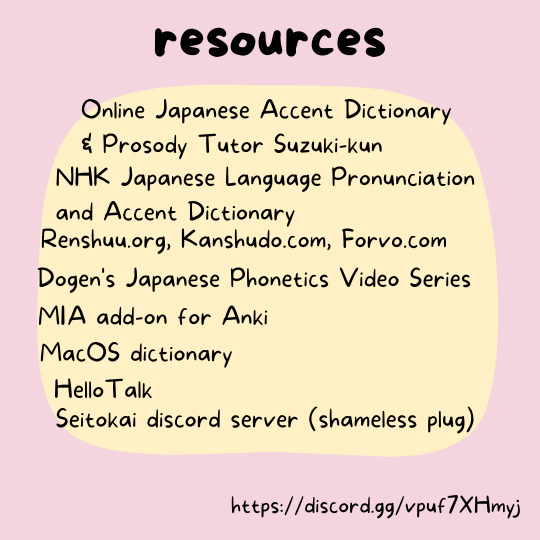

This was launched on the Seitokai IG (seitokaisnihongo). Keep reading this post to get information that is written on the graphics (and the IG caption).
This is a new series that I've been working on for a bit! It'll be discussing pitch accent, dialects, listening comprehension, and anything else that may fall within that category.
If there's a particular dialect that you'd like for us to cover in this series, feel free to stick it in the reblogs, my inbox, my asks, on the Seitokai instagram, or the Seitokai discord server!
Without further ado, here is what the posts say above!
Pitch, Please! Let's talk about pitch accent.
What is it?
Pitch accent, known as 高低アクセント(kōtei akusento) in Japanese, refers to when a language uses pitch to distinguish between homonyms rather than stress/volume. For example: あめ, meaning rain (high pitch to low) vs あめ, meaning candy (low pitch to high pitch).
Pitch accent can vary by region and dialect. The previous example was based on standard/Tokyo dialect. However, the pitch accent is swapped with the Kansai dialect. あめ, meaning rain goes from low pitch to high and あめ, meaning candy goes from high pitch to low.
There are four (4) pitch accent patterns: 平板 (へいばん), 頭高 (あたまだか), 中高 (なかだか), and 尾高 (おだか). These will be discussed in further detail in a later post within this series.
How to work on it?
Listen to native speakers (podcasts, news channels, videos, etc.)
Converse with native speakers (if possible)
Mimic the correct pronunciation
Be willing to ask for help and accept correction
Resources
Online Japanese Accent Dictionary & Prosody Tutor Suzuki-kun
NHK Japanese Language Pronunciation and Accent Dictionary
Renshuu.org, Kanshudo.com, Forvo.com
Dogen's Japanese Phonetics Video Series
MIA add-on for Anki
MacOS dictionary
HelloTalk
If you're looking for fellow learners, there are over 500 of us in the Seitokai discord server (shameless plug) and we'd love to have you!
#japanese#learn japanese#study japanese#pitch accent#japanese dialects#japanese grammar#kanji#vocab#jlpt#reading practice#listening comprehension#reading comprehension#shay's back with another post#pitch please#linguistics#seitokai#grammar
234 notes
·
View notes
Text
Learning a language is more accessible than it's ever been
Really.
There's such a wide variety of free lessons, resources, communities, and language exchanges.
This is especially true for Japanese and other languages not commonly taught in schools.
We've been running a mildly successful Discord server for a few years now (500+ members), but now we want to use our knowledge and experience to provide *free* lessons, utilizing *free* resources in every format possible, which will eventually span from N5-N1 fluency levels.
Our lesson posts will have "homework", which are apps, websites, or Youtube videos you can use to practice what you have learned, which you can pick and choose what homework format you prefer.
Don't want to download Duolingo for our first lesson's practice? Watch JapanesePod101's Youtube video on the topic instead. Don't like that? Try the link to Tofugu which covers the same topics as our lesson.
We will also cover topics such as language exposure when you can't visit the country, exercises, community games held on our Discord (we're working on Japanese Trivia Monopoly for N5 right now), streams, and more just like we always have in our Discord server!
Ready to learn Japanese, for free, regardless of skill level?
Here's the link to sign up to our Discord server.
We can't wait to see you there!
またね~

#japanese studyblr#studyspiration#study#japanese#nihongo#japan#japanese culture#japanese language#japanese learning#japanese vocabulary#learn japanese#learning japanese#kanji#hiragana#katakana
232 notes
·
View notes
Text

"When in Japan - Learning Nihongo"
Learning the language will help you conveniently read the signs and interact with locals when you visit Japan.
by Jose Maria Tiquia
#art#cartoon art#cartoon#comic#comic strip#vector#drawing#cartoon illustration#illustration#illustrator#digital art#japan#japanese#nihongo#language#study#learning#hiragana#katakana#kanji#artworks#tiquiajomari
98 notes
·
View notes